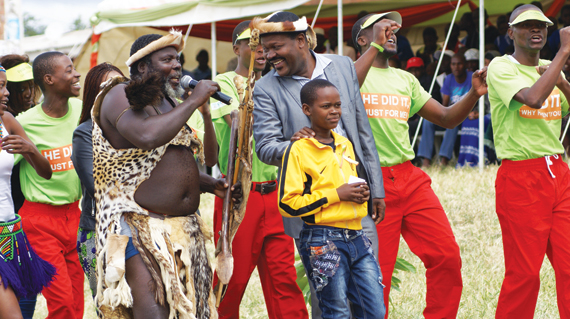
CIRCUMCISION is the surgical removal of the skin covering the tip of the penis.
BENSON DUBE OWN CORRESPONDENT
For some people, circumcision is a religious ritual and to others it can be a matter of family tradition, personal hygiene or preventive healthcare. To others, circumcision amounts to causing bodily harm.
In Zimbabwe, circumcision had for long been practiced as a matter of family tradition with the Venda, Tshangaana and Xhosa groups in the southern parts of the country.
Boys between the ages of 13 and 17 typically attend ritual ceremonies during school holidays whereby they go to remote mountainside camps. They live in a community and perform secret rituals before and after undergoing the circumcision, performed without any anaesthetic.
The circumcision is performed by a traditional healer during a ceremony shrouded in mystery. Only men are allowed to enter the camps and are sworn into secrecy upon return. It is done as part of the coming-of-age ritual.
According to Prince MacLeod Tshawe of the Xhosa people, circumcision is a cultural heritage which has been passed from generation to generation. Xhosa people execute circumcision rituals during the winter months of June and July.
Tshawe said the reason for this ritual was to keep an individual free from sexually transmitted infections (STIs).
- Chamisa under fire over US$120K donation
- Mavhunga puts DeMbare into Chibuku quarterfinals
- Pension funds bet on Cabora Bassa oilfields
- Councils defy govt fire tender directive
Keep Reading
“As Xhosa people, we inherited the circumcision rituals from our forefathers and it is done to prevent STIs and to keep an individual clean.
“For example, if one is not circumcised, a lot of dirt accumulates under the foreskin. A person who is yet to be circumcised is referred to as inkwenkwe,” Tshawe said.
He said an inkwenkwe is kept in a grass hut called ibumeni where an elder known as ungcibi performs the circumcision. The boy is nursed by another elder referred to as ikhakhatha who monitors the healing of the wound.
The patient is kept for four weeks and not allowed to take anything salty to prevent the wound from forming watery fluids around the severed area which is bandaged by a substance referred to as ingcotho to prevent bacteria collecting. Those who despise traditional methods undergo surgical procedures at hospitals and clinics where anaesthesia is used.
But that still involves pain and bleeding which has made a lot of people hesitate to undergo the procedure despite the accruing health benefits.
However, there has been a revolution in the manner in which modern circumcisions are conducted.
Cutting edge technology now ensures that circumcision is painless since it might not involve the cutting of the foreskin or bleeding.
Population Services International (PSI) last week introduced a new revolutionary way of circumcision known as the prepex method.
The prepex method takes about four minutes to perform. A ring is inserted on the penis under the foreskin and then an elastic rubber band is drawn over the foreskin following the groove of the ring.
The ring and rubber band prevent blood from circulating to the foreskin and within six hours, it will start to die.
After seven days, the foreskin would be completely dead and the patient then goes to the clinic to have the ring removed and the dead foreskin falls off. According to a provincial aids co-ordinator Sinatra Nyathi the prepex method does not involve the use of an injection, but liquid is applied around the penis to enable easy insertion of the ring and rubber band.
“The method is supposed to be pain free as there is no bleeding,” Nyathi said.
One of the first people to undergo the prepex method at the Bulawayo Eye Clinic, Shepard Mthethwa, said he was afraid in the beginning until he saw some guys walking out of the theatre showing no signs of pain.
Mthethwa’s procedure was done full view of journalists with his blessings.
“At first l thought it was painful until l saw some guys coming from the theatre without showing any pain and that is when l decided to undergo this circumcision,” Mthethwa said.
The prepex method was launched at Lobengula Clinic on Thursday. Local dub poet Albert Nyathi and his son Mthabisi underwent the procedure.
PSI currently has nine centres across the country that offer the prepex circumcision method and more are set to be rolled out to ensure an increase in uptake.










